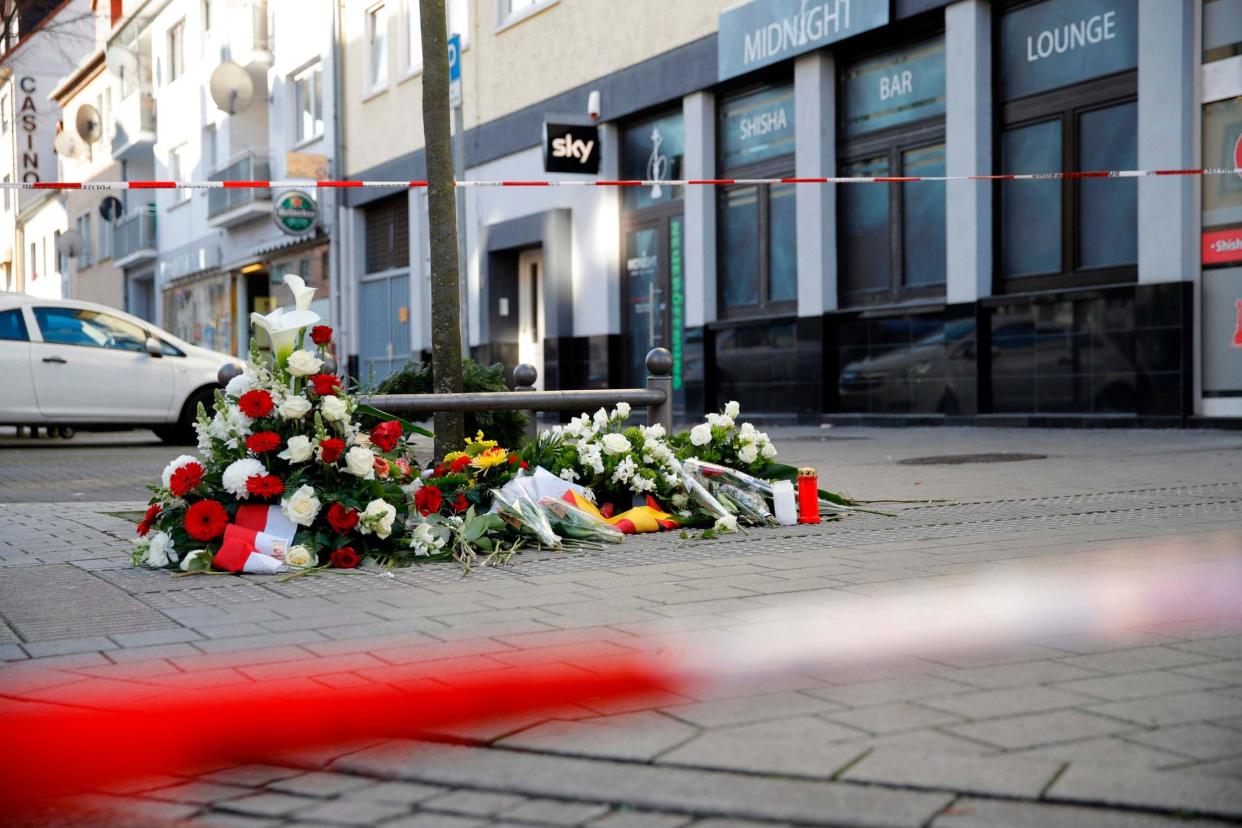The horror of Hanau shows we must wake up to the far-Right threat

David Baddiel’s superb BBC documentary on Holocaust denial this week — do watch it on iPlayer if you haven’t yet seen it — was both chilling in its historical detail and unnerving in its contemporary resonance. At the heart of the programme was an ethical dilemma: whether it was appropriate to meet a Holocaust denier, and thus risk oxygenating a series of claims that are morally and intellectually contemptible.
Correctly, Baddiel concluded that — on balance — it was indeed necessary to confront such a person in his report: supercharged by the internet and the resurgence of the extreme Right, this form of toxic denialism is simply too prevalent now to be dismissed as marginal. It must be satirised, dismantled and challenged relentlessly.
It is in the same poisonous context that we must consider the actions of Tobias R, the suspect in the killing of nine people from immigrant backgrounds in Wednesday evening’s shootings in Hanau. In the letter and video that he left behind, the shooter apparently demanded the “elimination” of Israel and the destruction of “certain peoples whose expulsion from Germany can no longer be achieved”.
His statement was, it seems, a demented soup of hatred and conspiracy theories — including a “personal message to all Americans”, referring to the viral digital far-Right conspiracy cult of “QAnon” that reveres President Donald Trump as a courageous leader battling against ritual paedophilia.

Such gibberish always gives comfort to those who insist on characterising killers such as Tobias R as “lone wolves”. Yet, as Dutch political scientist Cas Mudde argued in his recent book The Far Right Today, this is a false dichotomy: we need to see such apparently “solitary actors” in the context of “broader far-Right subcultures, particularly online.”
In Germany, those subcultures have spawned many horrors in recent months. Last Friday, 12 members of an extreme-Right group were arrested, pre-empting an alleged plot to carry out large-scale attacks on mosques. In October, an assault on a synagogue in Halle on the holy day of Yom Kippur resulted in the death of two people. Naturally, the rise of the extreme Right is especially appalling to Germans who have laboured for decades to exorcise the spectre of Nazism.
When we need politicians with the courage to stand up to ugly nationalism, we get the exact opposite
But the surge in Right-wing “identitarianism” is a pan-European crisis. As Andrew Parker, the director of MI5, and Cressida Dick, the Commissioner of the Metropolitan Police, have made very clear, the extreme Right deserves to be taken as seriously as jihadi groups: neo-Nazism, both as an online ideology and an incentive to violence, is a clear and present danger in 21st-century
Britain. A third of all terror plots to kill between 2017 and 2019 were planned by the far Right. What has changed, and dramatically so, is the relationship between mainstream politics and what used to be considered the fringe. In 1968, Enoch Powell’s “rivers of blood” speech provided a rhetorical border beyond which respectable politicians would not tread: it defined the boundaries of acceptable debate on race, immigration and our multi-ethnic society. But those boundaries have melted away. The distinction between the margins and the mainstream is no longer clear: instead, there is a continuum of rhetoric and activism that stretches from the centre of politics to the most hideous recesses of the online world.
To be absolutely clear: Nigel Farage’s appalling “Breaking Point” poster during the 2016 referendum campaign was not an incitement to murder, or anything like it. Boris Johnson’s description of Muslim women in religious clothing as “letterboxes” and those who wear the niqab, covering the face, as “looking like a bank robber” was not directly intended to stir up race hate. Equally, it is idle to pretend that such imagery, tropes and rhetoric do not raise the social temperature and — for those looking for an excuse — create what appears to be a permissive environment for more extreme action.
This is the price of populism. Senior politicians used to argue that effective immigration control was necessary to prevent the rise of far-Right nationalism. In contrast, today’s populist governments stir up emotions instead of restraining them. When Donald Trump stated that there were “very fine people” on the neo-Nazi side of the Charlottesville riots he crossed a line — and many others around the world have followed.
Witness the unintelligible mess of Home Secretary Priti Patel’s new immigration rules. Presented as an exercise in economic logic, they enshrine precisely the opposite — a shabby nativism camouflaged as a crusade to “upskill” those who are British-born and “economically inactive” (most of whom, in fact, are carers, students, the retired, and the long-term sick).
It is a labour-market strategy doomed to failure. But the invidious sentiments to which it appeals — that we are indeed at “breaking point”, that foreigners take jobs from Britons, that immigration sharply depresses wages — will be bolstered, yet again. The very premise of this blueprint is divisive; its prospects of success, given Patel’s spectacularly dysfunctional management style, are vanishingly small. But it is important that she alone does not carry the can. Every minister who has signed up to the new rules of the Johnson regime must own the consequences of this plan.
And therein lies the ugly heart of the matter. At a moment in history when liberal democracies most need statesmanship and politicians with the courage to stand up to ugly nationalism, we are being rewarded with precisely the opposite: a chorus of dog whistles, a carnival of plausible deniability, a rush to the bottom of the barrel where the deadliest demons lurk.

 Yahoo News
Yahoo News 
